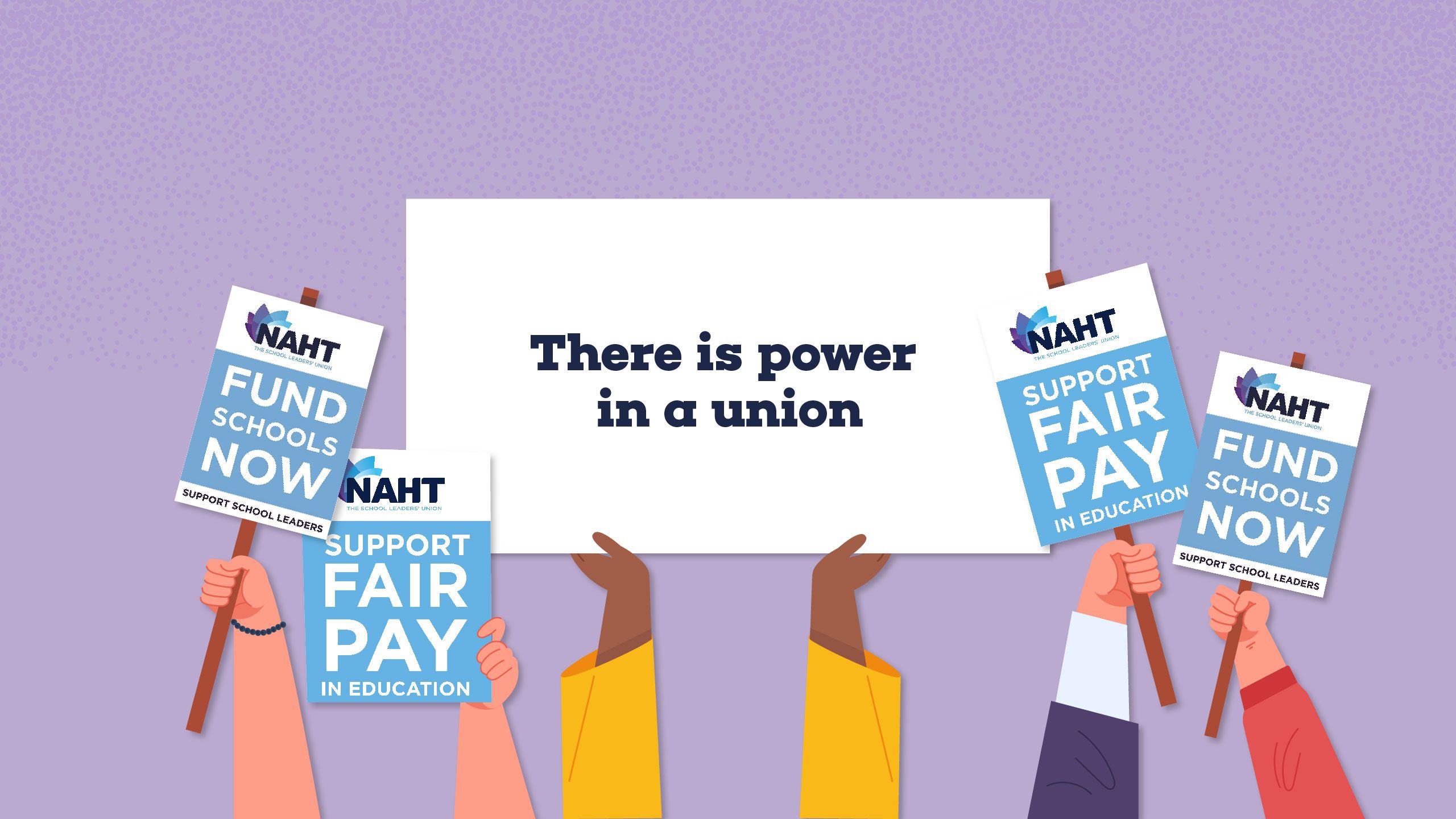
Leadership Focus journalist Nic Paton speaks to school leaders and NAHT staff about the union’s recent campaigning activity, ballots and what we can expect this autumn.
Just a few weeks ago, the term ‘school’s out’ was looking set to be grimly synonymous with banners, braziers and barricades this autumn, rather than the prospect of the long summer break.
The surprise move in mid-July by the government to accept the 6.5% uplift for teachers and school leaders recommended by the School Teachers’ Review Body and, critically, also to part fund it (even if schools will still have to find 3.5%), has, quite suddenly, potentially changed that landscape, at least in England.

PAUL WHITEMAN
NAHT GENERAL SECRETARY
NAHT general secretary Paul Whiteman rightly described it as “a pivotal moment” in the profession’s ongoing dispute with the government. As he put it:
“There is no doubt in my mind that the threat of industrial action by our members was key in bringing the government back to the table and in securing this improved offer. Our collective strength has undeniably made a difference.”
However, given the hardening mood – anger in many parts – within the profession that has been building for months now, just how much (if at all) this new offer has changed the wider direction of travel is not yet clear.
If we track back over the past eight to 10 months, it is apparent there has been a growing sense of frustration building across the different nations of Great Britain. This makes it by no means certain that the profession is currently in the mood for compromise, whether in England or elsewhere.
Indeed, as Paul told Leadership Focus – but, to emphasise, speaking before the government made its 6.5% offer – it has been “quite astonishing how all the governments that we deal with – in England, Wales, Northern Ireland and Jersey – have so badly judged where they’ve left their teaching workforces.”
He added: “In terms of morale, in terms of the pressure our members are under, in terms of workload, in terms of high-stakes accountability, in terms of recruitment and retention, and in terms of the erosion of reward, remuneration and terms and conditions – across the profession, what I’m hearing is our members suddenly saying, ‘look, enough is enough’.”
In England, this digital edition of Leadership Focus will land with you pretty much at the same point as we discover the outcome of the poll on whether members agree with NAHT’s national executive committee’s recommendation to accept the new offer.
At much the same time, we should discover the outcome of NAHT’s ballot of some 27,000 members in England – which predated the government’s offer – on whether to take industrial action over pay this autumn.
Of course, the outcome of the first will have a direct bearing on the latter in terms of the union’s next steps, but regardless of the outcome, it is fair to say we have witnessed an unprecedented determination from our members to make their voices heard.






Just a few weeks ago, the term ‘school’s out’ was looking set to be grimly synonymous with banners, braziers and barricades this autumn, rather than the prospect of the long summer break.
The surprise move in mid-July by the government to accept the 6.5% uplift for teachers and school leaders recommended by the School Teachers’ Review Body and, critically, also to part fund it (even if schools will still have to find 3.5%), has, quite suddenly, potentially changed that landscape, at least in England.

PAUL WHITEMAN
NAHT GENERAL SECRETARY
NAHT general secretary Paul Whiteman rightly described it as “a pivotal moment” in the profession’s ongoing dispute with the government. As he put it:
“There is no doubt in my mind that the threat of industrial action by our members was key in bringing the government back to the table and in securing this improved offer. Our collective strength has undeniably made a difference.”
However, given the hardening mood – anger in many parts – within the profession that has been building for months now, just how much (if at all) this new offer has changed the wider direction of travel is not yet clear.
If we track back over the past eight to 10 months, it is apparent there has been a growing sense of frustration building across the different nations of Great Britain. This makes it by no means certain that the profession is currently in the mood for compromise, whether in England or elsewhere.
Indeed, as Paul told Leadership Focus – but, to emphasise, speaking before the government made its 6.5% offer – it has been “quite astonishing how all the governments that we deal with – in England, Wales, Northern Ireland and Jersey – have so badly judged where they’ve left their teaching workforces.”

He added: “In terms of morale, in terms of the pressure our members are under, in terms of workload, in terms of high-stakes accountability, in terms of recruitment and retention, and in terms of the erosion of reward, remuneration and terms and conditions – across the profession, what I’m hearing is our members suddenly saying, ‘look, enough is enough’.”
In England, this digital edition of Leadership Focus will land with you pretty much at the same point as we discover the outcome of the poll on whether members agree with NAHT’s national executive committee’s recommendation to accept the new offer.
At much the same time, we should discover the outcome of NAHT’s ballot of some 27,000 members in England – which predated the government’s offer – on whether to take industrial action over pay this autumn.
Of course, the outcome of the first will have a direct bearing on the latter in terms of the union’s next steps, but regardless of the outcome, it is fair to say we have witnessed an unprecedented determination from our members to make their voices heard.

SIMON KIDWELL
NAHT PRESIDENT-ELECT AND HEAD TEACHER OF HARTFORD MANOR PRIMARY SCHOOL AND NURSERY IN HARTFORD, CHESHIRE
“I’ve got colleagues who said, ‘I’ve never voted in a ballot before’, or ‘I’ve never voted yes to industrial action before’, who now are; I know people who chose not to vote in the autumn ballot in England but now are,” agrees Simon Kidwell, NAHT president-elect and head teacher of Hartford Manor Primary School and Nursery in Hartford, Cheshire.
“Some of it is about funding, some of it is about not being able to attract people to the profession, some of it is about workload, and some of it is about pay; I worry about the young people coming into the profession. I have four early career teachers at my school, and I worry about them being able to sustain the job. The workload issues are driving teachers out of the profession,” he adds.
Counter-intuitively, part of this hardening of attitudes can be traced back to last autumn’s NAHT ballot in England for industrial action, which failed to meet the threshold. Nevertheless, it was still the first time NAHT members in England had been balloted for action over pay in the union’s 126-year history.
Even just that threat of action (as, arguably, it has now done again with the second ballot), combined with strike action by the other unions, notably the NEU, resulted in the government’s 4.3% unfunded spring pay offer, which was roundly rejected by NAHT members in April, leading to the second ballot.

ROB KELSALL
NAHT ASSISTANT GENERAL SECRETARY
“There is no doubt that, in our 126 years as a union, membership across all of the jurisdictions in which we operate has recognised that, actually, it comes down to them to preserve and protect the very heart and soul of education,” emphasises NAHT assistant general secretary Rob Kelsall, fresh from last month’s mass rally outside parliament, which saw NAHT lobbying MPs alongside the NEU, Unison, ASCL, NGA and others.
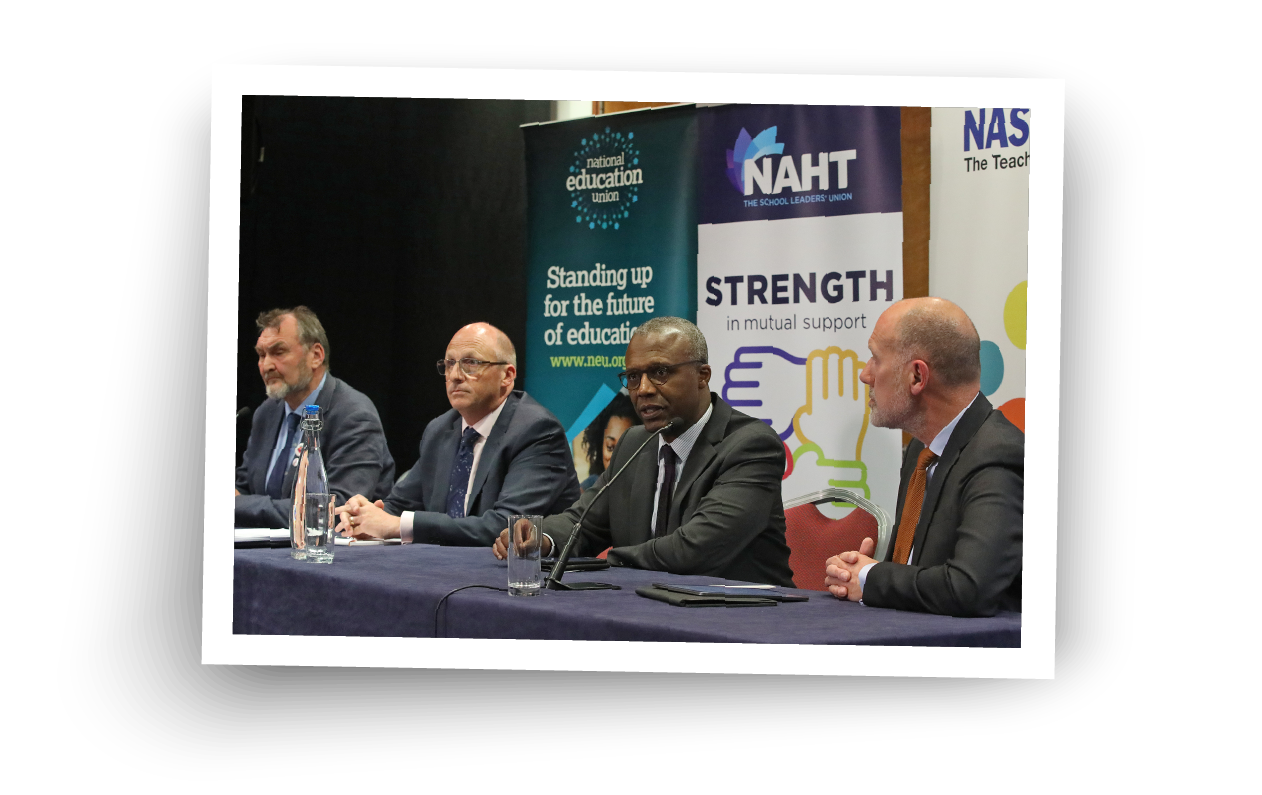
The fact that the general secretaries of ASCL, NAHT, NASUWT and NEU (pictured) came together at NAHT’s Annual Conference in April also sent a hugely powerful message to education secretary Gillian Keegan about the unprecedented level of feeling and anger building – the desire for meaningful, tangible change within education.
The accelerating momentum for reform of Ofsted is being examined in more detail elsewhere in this edition of Leadership Focus. But, as Rob highlights, the sense of ‘there but for the grace of God go I’ outrage sparked by the death of Ruth Perry (and not least the fact that the school has since been regraded) has been an important factor in crystallising attitudes.
“Ruth Perry’s sister, Julia Waters, has become a friend to NAHT and me personally, and there’s no doubt that the anger surrounding the tragedy has been a factor in our members’ determination to demand change,” he says.
“On the ground, that sense of being stronger together between teachers and leaders, irrespective of their union membership, continues to grow,” he tells Leadership Focus.
“I think there is a growing recognition – and it has probably been building for at least the last five years – that the underfunding of our schools, coupled with the growing disparity in teachers’ and leaders’ pay, the recruitment and retention crisis, the crippling workload demands on the profession and the anger over a punitive assessment and accountability system (crystallised in the tragedy surrounding the death of Ruth), has underlined to our members that they need to stand up and make their voices heard,” Rob adds.
Whether a 6.5% offer part-funded is enough to change this trajectory, only time will tell. However, irrespective of the outcome of the second ballot, NAHT’s local, regional and branch officers can be immensely proud of the hard work and dedication they have put in to manage what has been a significant logistical and organisational challenge, Rob emphasises.
“What has been remarkable is the sheer number of our local officials, two-thirds of whom are serving school leaders, who have been prepared to give up their time, their evenings, to get the vote out. To get on the phone and call their peers to encourage them to return their ballot papers. There has been a real sense of solidarity and everyone working together,” he says.




SIMON KIDWELL
NAHT PRESIDENT-ELECT AND HEAD TEACHER OF HARTFORD MANOR PRIMARY SCHOOL AND NURSERY IN HARTFORD, CHESHIRE
“I’ve got colleagues who said, ‘I’ve never voted in a ballot before’, or ‘I’ve never voted yes to industrial action before’, who now are; I know people who chose not to vote in the autumn ballot in England but now are,” agrees Simon Kidwell, NAHT president-elect and head teacher of Hartford Manor Primary School and Nursery in Hartford, Cheshire.

“Some of it is about funding, some of it is about not being able to attract people to the profession, some of it is about workload, and some of it is about pay; I worry about the young people coming into the profession. I have four early career teachers at my school, and I worry about them being able to sustain the job. The workload issues are driving teachers out of the profession,” he adds.
Counter-intuitively, part of this hardening of attitudes can be traced back to last autumn’s NAHT ballot in England for industrial action, which failed to meet the threshold. Nevertheless, it was still the first time NAHT members in England had been balloted for action over pay in the union’s 126-year history.
Even just that threat of action (as, arguably, it has now done again with the second ballot), combined with strike action by the other unions, notably the NEU, resulted in the government’s 4.3% unfunded spring pay offer, which was roundly rejected by NAHT members in April, leading to the second ballot.

ROB KELSALL
NAHT ASSISTANT GENERAL SECRETARY
“There is no doubt that, in our 126 years as a union, membership across all of the jurisdictions in which we operate has recognised that, actually, it comes down to them to preserve and protect the very heart and soul of education,” emphasises NAHT assistant general secretary Rob Kelsall, fresh from last month’s mass rally outside parliament, which saw NAHT lobbying MPs alongside the NEU, Unison, ASCL, NGA and others.

The fact that the general secretaries of ASCL, NAHT, NASUWT and NEU (pictured) came together at NAHT’s Annual Conference in April also sent a hugely powerful message to education secretary Gillian Keegan about the unprecedented level of feeling and anger building – the desire for meaningful, tangible change within education.
The accelerating momentum for reform of Ofsted is being examined in more detail elsewhere in this edition of Leadership Focus. But, as Rob highlights, the sense of ‘there but for the grace of God go I’ outrage sparked by the death of Ruth Perry (and not least the fact that the school has since been regraded) has been an important factor in crystallising attitudes.
“Ruth Perry’s sister, Julia Waters, has become a friend to NAHT and me personally, and there’s no doubt that the anger surrounding the tragedy has been a factor in our members’ determination to demand change,” he says.
“On the ground, that sense of being stronger together between teachers and leaders, irrespective of their union membership, continues to grow,” he tells Leadership Focus.
“I think there is a growing recognition – and it has probably been building for at least the last five years – that the underfunding of our schools, coupled with the growing disparity in teachers’ and leaders’ pay, the recruitment and retention crisis, the crippling workload demands on the profession and the anger over a punitive assessment and accountability system (crystallised in the tragedy surrounding the death of Ruth), has underlined to our members that they need to stand up and make their voices heard,” Rob adds.
Whether a 6.5% offer part-funded is enough to change this trajectory, only time will tell. However, irrespective of the outcome of the second ballot, NAHT’s local, regional and branch officers can be immensely proud of the hard work and dedication they have put in to manage what has been a significant logistical and organisational challenge, Rob emphasises.
“What has been remarkable is the sheer number of our local officials, two-thirds of whom are serving school leaders, who have been prepared to give up their time, their evenings, to get the vote out. To get on the phone and call their peers to encourage them to return their ballot papers. There has been a real sense of solidarity and everyone working together,” he says.

DAVE WOODS
EALING BRANCH SECRETARY AND LONDON REGIONAL PRESIDENT
One of those working hard to get the vote out has been Ealing branch secretary and London regional president Dave Woods. He is clear that while pay is, of course, an issue, it is by no means the only issue agitating members right now.
“From discussions with local and regional colleagues, the issue of pay is uncomfortable for many school leaders,” he tells Leadership Focus. “However, when we look at the pay for all school staff, there is no leader that I’ve spoken to who does not want all school staff to be paid fairly, properly and with guaranteed funding.
“I’m seeing really experienced teaching assistants, and I have a special needs unit in my school, which is highly skilled and difficult work, going off to work at local supermarkets for a pound an hour less but none of the extra stress, workload and emotional intensity that comes with these roles. There is now a national workforce shortage.
“On top of that, we’ve had the explosion over Ofsted – like the breaking of a dam. That high-stakes, cliff-edge accountability that falls on head teachers and deputy head teachers, coupled with all the existing problems, has meant people are saying, actually, it’s not just about funding anymore. It is about accountability, it is about recruitment, and it is also about pay. These four issues are interlinked and intermingled,” he adds.

DEBRA DE MUSCHAMP
SUNDERLAND BRANCH SECRETARY AND NORTH EAST REGIONAL SECRETARY
“Some members have been telling me, even normally quite hard-to-reach members, ‘Yes, I have voted; now is the time when we need to stand together’. For others, it is harder to gauge; it is quite hard to call. Voting for industrial action is still a big deal for many members,” agrees Debra de Muschamp, Sunderland branch secretary and North East regional secretary.
“Nevertheless, I get a strong sense that everyone is incensed. There is a level of anger and disappointment out there, distress actually, with the system we are living, breathing and trying to make work that I’ve never seen before – and I’m in my 38th year of teaching and 23rd year of leadership,” she adds.



DAVE WOODS
EALING BRANCH SECRETARY AND LONDON REGIONAL PRESIDENT
One of those working hard to get the vote out has been Ealing branch secretary and London regional president Dave Woods. He is clear that while pay is, of course, an issue, it is by no means the only issue agitating members right now.
“From discussions with local and regional colleagues, the issue of pay is uncomfortable for many school leaders,” he tells Leadership Focus. “However, when we look at the pay for all school staff, there is no leader that I’ve spoken to who does not want all school staff to be paid fairly, properly and with guaranteed funding.

“I’m seeing really experienced teaching assistants, and I have a special needs unit in my school, which is highly skilled and difficult work, going off to work at local supermarkets for a pound an hour less but none of the extra stress, workload and emotional intensity that comes with these roles. There is now a national workforce shortage.
“On top of that, we’ve had the explosion over Ofsted – like the breaking of a dam. That high-stakes, cliff-edge accountability that falls on head teachers and deputy head teachers, coupled with all the existing problems, has meant people are saying, actually, it’s not just about funding anymore. It is about accountability, it is about recruitment, and it is also about pay. These four issues are interlinked and intermingled,” he adds.

DEBRA DE MUSCHAMP
SUNDERLAND BRANCH SECRETARY AND NORTH EAST REGIONAL SECRETARY
“Some members have been telling me, even normally quite hard-to-reach members, ‘Yes, I have voted; now is the time when we need to stand together’. For others, it is harder to gauge; it is quite hard to call. Voting for industrial action is still a big deal for many members,” agrees Debra de Muschamp, Sunderland branch secretary and North East regional secretary.
“Nevertheless, I get a strong sense that everyone is incensed. There is a level of anger and disappointment out there, distress actually, with the system we are living, breathing and trying to make work that I’ve never seen before – and I’m in my 38th year of teaching and 23rd year of leadership,” she adds.


While much of the focus has been – and will continue to be – on what happens post-ballot and post-consultation in England, it is not the only place where members have been making their voices heard in recent months.
In Jersey, Rob Kelsall points out, negotiations over a 7.9% pay offer ran into the sand in May, and as in England, a ballot on industrial action was held over the summer.
“That ‘final’ offer of 7.9% might have sounded quite attractive. But, of course, if you consider the exorbitant inflation rates and the current cost of living in Jersey, the offer represented a significant pay cut for leaders and teachers,” Rob says.
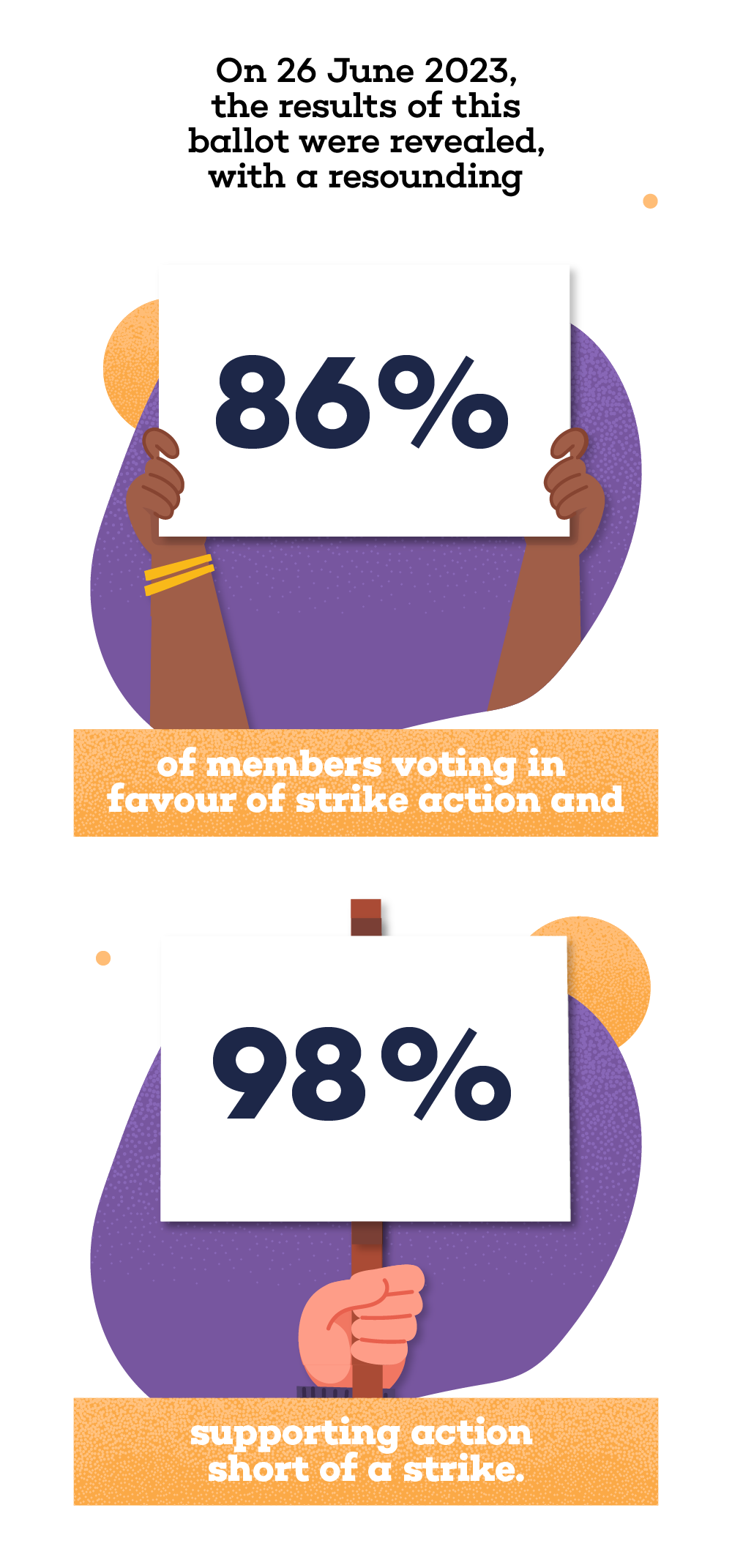
Following the ballot results, NAHT’s Jersey executive decided members should take action short of a strike in the first instance from Wednesday, 5 July 2023, which involves withdrawing from the following:


While much of the focus has been – and will continue to be – on what happens post-ballot and post-consultation in England, it is not the only place where members have been making their voices heard in recent months.
In Jersey, Rob Kelsall points out, negotiations over a 7.9% pay offer ran into the sand in May, and as in England, a ballot on industrial action was held over the summer.
“That ‘final’ offer of 7.9% might have sounded quite attractive. But, of course, if you consider the exorbitant inflation rates and the current cost of living in Jersey, the offer represented a significant pay cut for leaders and teachers,” Rob says.

Following the ballot results, NAHT’s Jersey executive decided members should take action short of a strike in the first instance from Wednesday, 5 July 2023, which involves withdrawing from the following:

Unlike in England, members in Wales and Northern Ireland have already made the psychological leap – crossed that emotional Rubicon – of stepping up to take industrial action.

LAURA DOEL
NAHT NATIONAL SECRETARY (WALES)
Industrial action in Wales began in February with action short of a strike, reports Laura Doel, NAHT national secretary (Wales).
This included our members withdrawing from administrative duties, reporting to local authorities and the Welsh Government, participating in consultations, having meetings after 5pm, or answering emails or calls after 3pm. “All those duties have become part of being a head teacher and a school leader, but they are actually way above what our members are supposed to be doing,” she says.
“Our action short of a strike was hugely successful. We entered into negotiations with the Welsh Government, and a new pay award was offered to teachers and leaders across Wales from the middle of March,” she adds. However, the additional 3% offer on top of the 5% recommended by the Independent Welsh Pay Review Body fell foul of the familiar stumbling block of not being fully funded.
“What we don’t want is a pay award where you have to make cuts to your existing budgets just to be able to pay people what they should be earning, one that takes money away from front-line teaching,” Laura explains.
“So, we balloted our members, who firmly rejected the offer on the basis that there wasn’t a clear funding arrangement in place and that there also wasn’t a workload agreement in place, which is another massive issue in Wales,” she adds. That led to a second ballot on taking action, including the option of escalating to strike action, with 74% of members voting in favour of strike action and 95% supporting action short of a strike.
“We got another strong mandate from members this time round in June, the same as when we balloted them in January,” Laura says.
“Our renewed mandate sends a clear message to the local authority employers and the Welsh Government that our members’ resolve has not weakened, and they remain determined to fight over pay, funding and workload.
“While all parties remain committed to negotiations, progress is slow. School leaders are taking a stand in their fight to defend education, and they won’t rest until they get what they need to support their learners,” adds Laura.




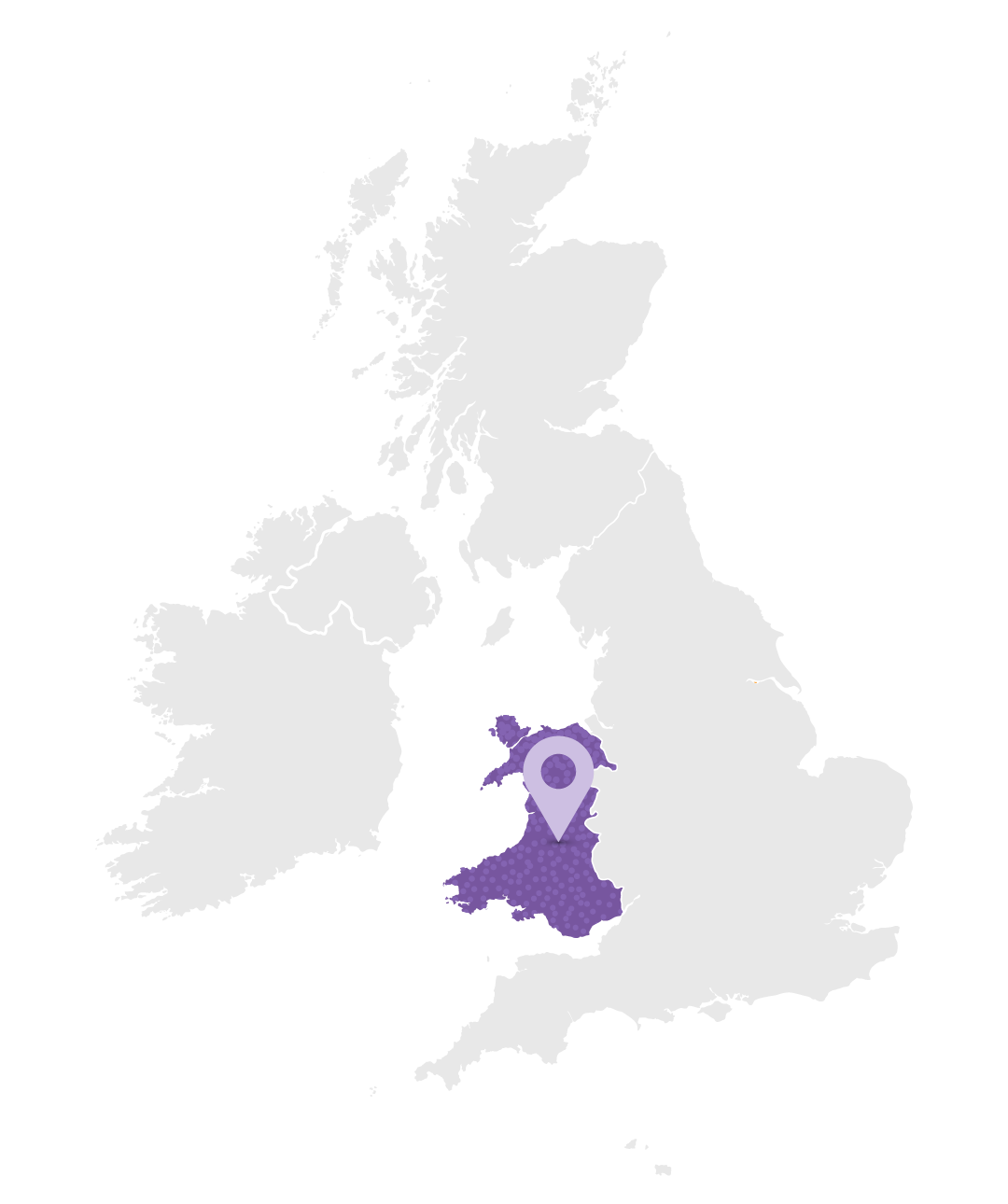
Unlike in England, members in Wales and Northern Ireland have already made the psychological leap – crossed that emotional Rubicon – of stepping up to take industrial action.

LAURA DOEL
NAHT NATIONAL SECRETARY (WALES)
Industrial action in Wales began in February with action short of a strike, reports Laura Doel, NAHT national secretary (Wales).
This included our members withdrawing from administrative duties, reporting to local authorities and the Welsh Government, participating in consultations, having meetings after 5pm, or answering emails or calls after 3pm. “All those duties have become part of being a head teacher and a school leader, but they are actually way above what our members are supposed to be doing,” she says.
“Our action short of a strike was hugely successful. We entered into negotiations with the Welsh Government, and a new pay award was offered to teachers and leaders across Wales from the middle of March,” she adds. However, the additional 3% offer on top of the 5% recommended by the Independent Welsh Pay Review Body fell foul of the familiar stumbling block of not being fully funded.
“What we don’t want is a pay award where you have to make cuts to your existing budgets just to be able to pay people what they should be earning, one that takes money away from front-line teaching,” Laura explains.
“So, we balloted our members, who firmly rejected the offer on the basis that there wasn’t a clear funding arrangement in place and that there also wasn’t a workload agreement in place, which is another massive issue in Wales,” she adds. That led to a second ballot on taking action, including the option of escalating to strike action, with 74% of members voting in favour of strike action and 95% supporting action short of a strike.
“We got another strong mandate from members this time round in June, the same as when we balloted them in January,” Laura says.
“Our renewed mandate sends a clear message to the local authority employers and the Welsh Government that our members’ resolve has not weakened, and they remain determined to fight over pay, funding and workload.
“While all parties remain committed to negotiations, progress is slow. School leaders are taking a stand in their fight to defend education, and they won’t rest until they get what they need to support their learners,” adds Laura.

In Northern Ireland, a successful ballot last September for action short of a strike and including strike action led to industrial action from mid-October, which then escalated in the run-up to Christmas. In February, the other four Northern Ireland teaching unions walked out on a half-day of strike action.

GRAHAM GAULT
INTERIM NAHT NATIONAL SECRETARY (NORTHERN IRELAND)
“We opted not to participate in that action, although we had a mandate to do so. We decided that the half day was problematic for our members, particularly members working in the special sector, who were worried how a half-day of action would work for their vulnerable children,” explains Graham Gault, interim NAHT national secretary (Northern Ireland).
Yet, in another tangible sign of how attitudes have been changing and hardening, by April, members nevertheless still found themselves on the picket lines, in another first for NAHT.
“For us in NAHT, this was a huge moment, momentous in fact, because never before has NAHT taken strike action on the issue of pay,” says Graham. “It was enormous, and we used the mandate our members had given us; it was a huge shock to the system that school leaders would ever contemplate taking such action.
“More than 90% of schools in Northern Ireland were closed. We had, we reckon, approaching 15% of our membership at a central rally in Belfast, which was very significant and a real show of strength and solidarity with our sister unions,” he adds.
On pay, members in Northern Ireland are still waiting for two outstanding pay claims (6% submitted in June 2021, and inflation plus 2% in June 2022) to be honoured. “It is farcical – in fact, we have now just submitted the June 2023 pay claim as well! They’re not actually even pay increases; they’re just looking to match inflation with a small amount of restoration from what has been lost in previous years,” says Graham in exasperation.
“But there is so much more at stake than just pay, as important as that is. Firstly, we have delivered a whole review of workload to the management side, and we are ready to negotiate on the 29 recommendations within that review. We also wanted to use the day of strike action to demonstrate that our members do have the strength, if they are not treated fairly, to bring the system to a close and to show that, in many respects, they are more animated about workload than they are about pay.
“We wanted to flex our muscles and show that, while we are always child and solutions focused, there is a ceiling to how patient our members can be. They feel they have been so badly treated – and teachers have been so badly treated – to the extent that their pay has been eroded by some 30% in real terms since 2010,” Graham adds.




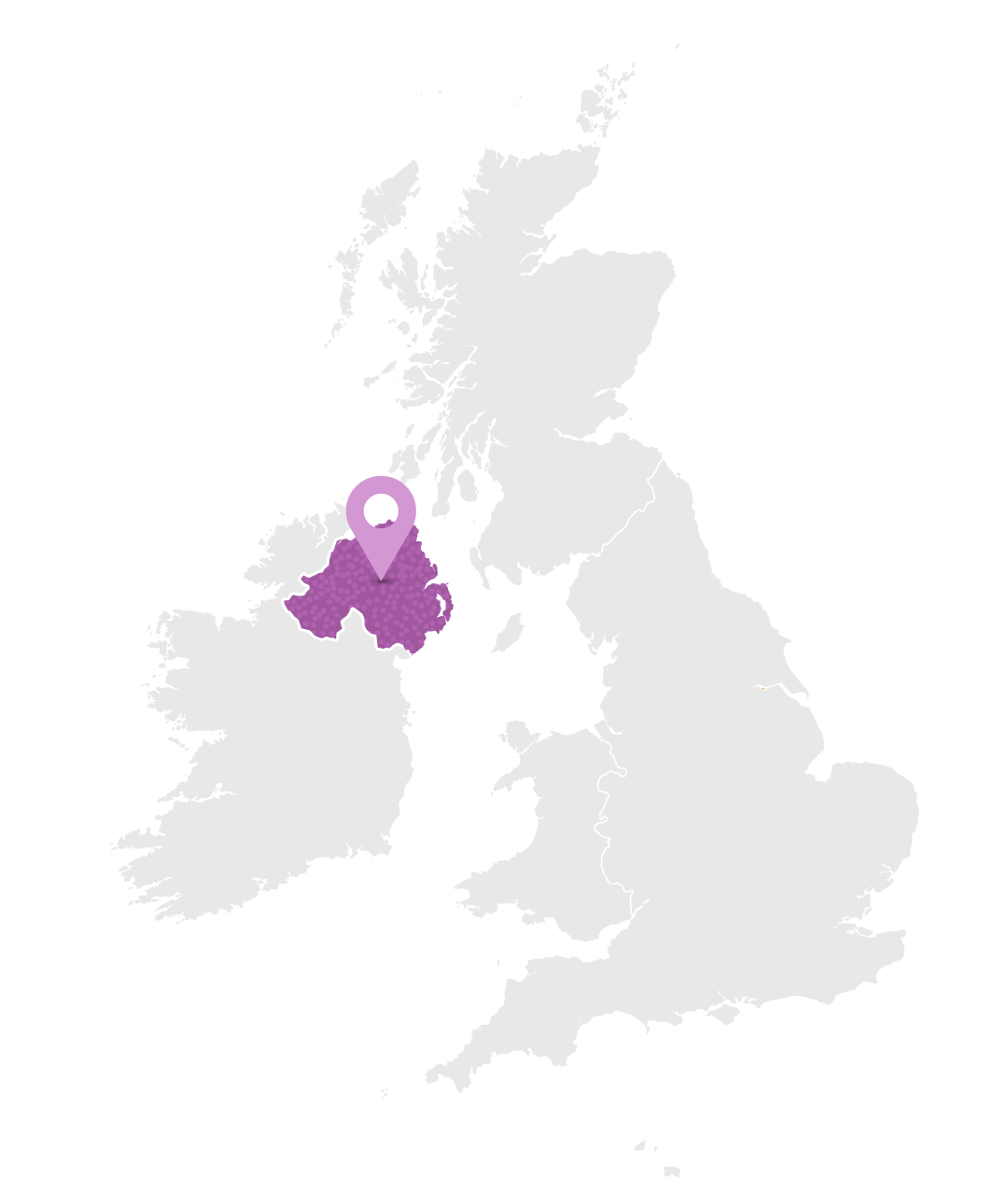
In Northern Ireland, a successful ballot last September for action short of a strike and including strike action led to industrial action from mid-October, which then escalated in the run-up to Christmas. In February, the other four Northern Ireland teaching unions walked out on a half-day of strike action.

GRAHAM GAULT
INTERIM NAHT NATIONAL SECRETARY (NORTHERN IRELAND)
“We opted not to participate in that action, although we had a mandate to do so. We decided that the half day was problematic for our members, particularly members working in the special sector, who were worried how a half-day of action would work for their vulnerable children,” explains Graham Gault, interim NAHT national secretary (Northern Ireland).
Yet, in another tangible sign of how attitudes have been changing and hardening, by April, members nevertheless still found themselves on the picket lines, in another first for NAHT.
“For us in NAHT, this was a huge moment, momentous in fact, because never before has NAHT taken strike action on the issue of pay,” says Graham. “It was enormous, and we used the mandate our members had given us; it was a huge shock to the system that school leaders would ever contemplate taking such action.
“More than 90% of schools in Northern Ireland were closed. We had, we reckon, approaching 15% of our membership at a central rally in Belfast, which was very significant and a real show of strength and solidarity with our sister unions,” he adds.
On pay, members in Northern Ireland are still waiting for two outstanding pay claims (6% submitted in June 2021, and inflation plus 2% in June 2022) to be honoured. “It is farcical – in fact, we have now just submitted the June 2023 pay claim as well! They’re not actually even pay increases; they’re just looking to match inflation with a small amount of restoration from what has been lost in previous years,” says Graham in exasperation.
“But there is so much more at stake than just pay, as important as that is. Firstly, we have delivered a whole review of workload to the management side, and we are ready to negotiate on the 29 recommendations within that review. We also wanted to use the day of strike action to demonstrate that our members do have the strength, if they are not treated fairly, to bring the system to a close and to show that, in many respects, they are more animated about workload than they are about pay.
“We wanted to flex our muscles and show that, while we are always child and solutions focused, there is a ceiling to how patient our members can be. They feel they have been so badly treated – and teachers have been so badly treated – to the extent that their pay has been eroded by some 30% in real terms since 2010,” Graham adds.

So where, then, does this leave us – leave members – as we look to the autumn? In England, clearly, it is unclear yet where the cards will fall. Leadership Focus will provide a post-ballot update for members in the autumn.

IAN HARTWRIGHT
NAHT HEAD OF POLICY (PROFESSIONAL)
Nevertheless, as Ian Hartwright, NAHT head of policy (professional), emphasises, while the government’s offer in England may be positive in and of itself, there remain long-term, systemic simmering tensions and frustrations that one single pay offer is unlikely to resolve.
“The reward for experience and leadership just seems to get smaller every year,” he tells Leadership Focus.
“Few graduates want to be a teacher, people in teaching don’t want to stay in teaching, too few teachers want to move up to senior leadership positions, and most assistants or deputies do not want to become head teachers. We are in a real crisis where pay is a massive issue, especially the lack of pay progression. Every leader’s pay is now worth about 80% of what it was in 2010.
“Not only are members not being remunerated fairly, but almost everyone now – whatever their seniority within a school and however well paid they are notionally – is being affected by the cost-of-living crisis, rising mortgage interest rates and so on. Increasingly, too, the micromanagement of the Department for Education is getting stronger and stronger. Combine that with all the issues around Ofsted, and things really are toxic,” Ian adds.
The fact that there is also a fin de siècle feeling to the current government as it staggers from crisis to crisis towards the next general election, still expected next autumn (even if whispers are growing of the possibility of a snap poll this autumn), is simply compounding the sense that change can – and must – come somehow and soon.


So where, then, does this leave us – leave members – as we look to the autumn? In England, clearly, it is unclear yet where the cards will fall. Leadership Focus will provide a post-ballot update for members in the autumn.

IAN HARTWRIGHT
NAHT HEAD OF POLICY (PROFESSIONAL)
Nevertheless, as Ian Hartwright, NAHT head of policy (professional), emphasises, while the government’s offer in England may be positive in and of itself, there remain long-term, systemic simmering tensions and frustrations that one single pay offer is unlikely to resolve.
“The reward for experience and leadership just seems to get smaller every year,” he tells Leadership Focus.
“Few graduates want to be a teacher, people in teaching don’t want to stay in teaching, too few teachers want to move up to senior leadership positions, and most assistants or deputies do not want to become head teachers. We are in a real crisis where pay is a massive issue, especially the lack of pay progression. Every leader’s pay is now worth about 80% of what it was in 2010.
“Not only are members not being remunerated fairly, but almost everyone now – whatever their seniority within a school and however well paid they are notionally – is being affected by the cost-of-living crisis, rising mortgage interest rates and so on. Increasingly, too, the micromanagement of the Department for Education is getting stronger and stronger. Combine that with all the issues around Ofsted, and things really are toxic,” Ian adds.
The fact that there is also a fin de siècle feeling to the current government as it staggers from crisis to crisis towards the next general election, still expected next autumn (even if whispers are growing of the possibility of a snap poll this autumn), is simply compounding the sense that change can – and must – come somehow and soon.
“This will be the last autumn, probably, before the next general election,” agrees Rob Kelsall. “I think that in itself will give us significant leverage, not only with the current incumbent government but also with all of the opposition parties. We want to make sure that the issues in education now are resolved and that education becomes the centre point in the general election.
“I think we are facing a watershed moment for education. In the last five years, people have waited patiently in anticipation to see the government and ministers deliver, only to be disappointed and let down time and time again.
“I think there is a sense of unity of purpose. The solidarity that is building between the different education unions is something that I think, I hope, will also give us purchase long into the future,” Rob adds.
“The education profession in Wales faces a really difficult and challenging autumn term,” agrees Laura Doel. “Although right now we’re talking about the impact of cuts and what school leaders might do to balance the books, it will have happened in September. So, then they will be living with the impact rather than just the fear of cuts.
“Head teachers and senior leaders, as they do, will slap on a smile; they will be at the gate in September, welcoming their learners with open arms and keen to get on with the academic year. But behind the scenes, they will be really struggling to meet the demands of the Welsh Government, to meet the demands of a whole host of policy initiatives that are still coming down the track, and deliver front-line teaching and learning.
“Over the past year, members in Wales have stepped up hugely. They are the only education union members taking part in industrial action. They have stuck their heads above the parapets and said, ‘No, enough is enough; this cannot go on’. And it has been really inspirational to see.
“Looking to September, we are holding the government’s feet to the fire when it comes to negotiations – and we have had very productive negotiations. But now is the time to really dig in; now is the time to stand firm. This is not going to be a quick fix. Members can take heart in the knowledge that change is happening, change is coming, and it is because of them. It is because our members have stood up,” Laura adds.
“The mood in Northern Ireland now is simply of total disappointment with our politicians,” says Graham Gault. “They have failed to recognise the absolute urgency of need in so many areas, but especially education, across Northern Ireland and our public services. All of the scaffolding that supports schools, particularly the most vulnerable children and families, in terms of additional funding streams has been withdrawn; it is all being drained away.”
Even though speculation is growing that the Stormont Northern Ireland Executive could perhaps be restored this autumn, following the agreement of the Windsor Framework in February, there will be a mass of issues and tensions to resolve.
“Even if we had a huge injection of cash to restore funding to what it was in 2010, it is going to take a generation to repair the damage that has been done. So, members are completely dissatisfied with our politicians to the extent that I’ve never seen before,” Graham adds.
“The demonstration of strike action has shown that our members are so animated, so angry and are prepared to close the system down, which is unusual for school leaders to do. But it has ensured at least that the issue of this dispute is the number one issue, the number one priority, for the Stormont Executive to resolve when it is re-established.
“We remain optimistic that the autumn will not be a period of discontent; we remain very solutions-focused with our sister unions on resolving this. However, nothing is off the table, and we have demonstrated now that when we say nothing is off the table, we will actually carry through with that threat,” Graham says.





“This will be the last autumn, probably, before the next general election,” agrees Rob Kelsall. “I think that in itself will give us significant leverage, not only with the current incumbent government but also with all of the opposition parties. We want to make sure that the issues in education now are resolved and that education becomes the centre point in the general election.

“I think we are facing a watershed moment for education. In the last five years, people have waited patiently in anticipation to see the government and ministers deliver, only to be disappointed and let down time and time again.
“I think there is a sense of unity of purpose. The solidarity that is building between the different education unions is something that I think, I hope, will also give us purchase long into the future,” Rob adds.
“The education profession in Wales faces a really difficult and challenging autumn term,” agrees Laura Doel. “Although right now we’re talking about the impact of cuts and what school leaders might do to balance the books, it will have happened in September. So, then they will be living with the impact rather than just the fear of cuts.
“Head teachers and senior leaders, as they do, will slap on a smile; they will be at the gate in September, welcoming their learners with open arms and keen to get on with the academic year. But behind the scenes, they will be really struggling to meet the demands of the Welsh Government, to meet the demands of a whole host of policy initiatives that are still coming down the track, and deliver front-line teaching and learning.

“Over the past year, members in Wales have stepped up hugely. They are the only education union members taking part in industrial action. They have stuck their heads above the parapets and said, ‘No, enough is enough; this cannot go on’. And it has been really inspirational to see.
“Looking to September, we are holding the government’s feet to the fire when it comes to negotiations – and we have had very productive negotiations. But now is the time to really dig in; now is the time to stand firm. This is not going to be a quick fix. Members can take heart in the knowledge that change is happening, change is coming, and it is because of them. It is because our members have stood up,” Laura adds.
“The mood in Northern Ireland now is simply of total disappointment with our politicians,” says Graham Gault. “They have failed to recognise the absolute urgency of need in so many areas, but especially education, across Northern Ireland and our public services. All of the scaffolding that supports schools, particularly the most vulnerable children and families, in terms of additional funding streams has been withdrawn; it is all being drained away.”
Even though speculation is growing that the Stormont Northern Ireland Executive could perhaps be restored this autumn, following the agreement of the Windsor Framework in February, there will be a mass of issues and tensions to resolve.
“Even if we had a huge injection of cash to restore funding to what it was in 2010, it is going to take a generation to repair the damage that has been done. So, members are completely dissatisfied with our politicians to the extent that I’ve never seen before,” Graham adds.
“The demonstration of strike action has shown that our members are so animated, so angry and are prepared to close the system down, which is unusual for school leaders to do. But it has ensured at least that the issue of this dispute is the number one issue, the number one priority, for the Stormont Executive to resolve when it is re-established.
“We remain optimistic that the autumn will not be a period of discontent; we remain very solutions-focused with our sister unions on resolving this. However, nothing is off the table, and we have demonstrated now that when we say nothing is off the table, we will actually carry through with that threat,” Graham says.

